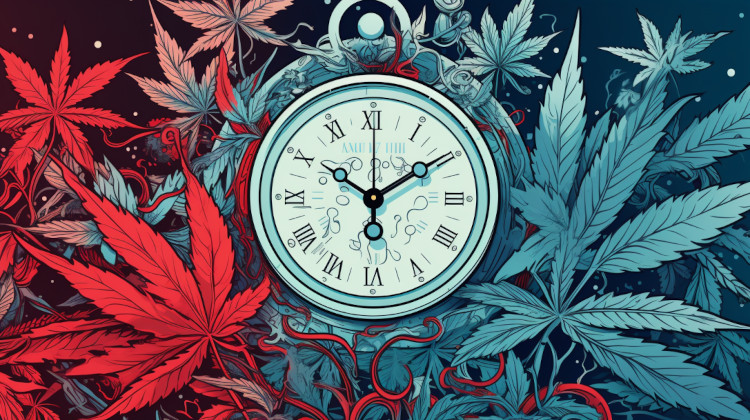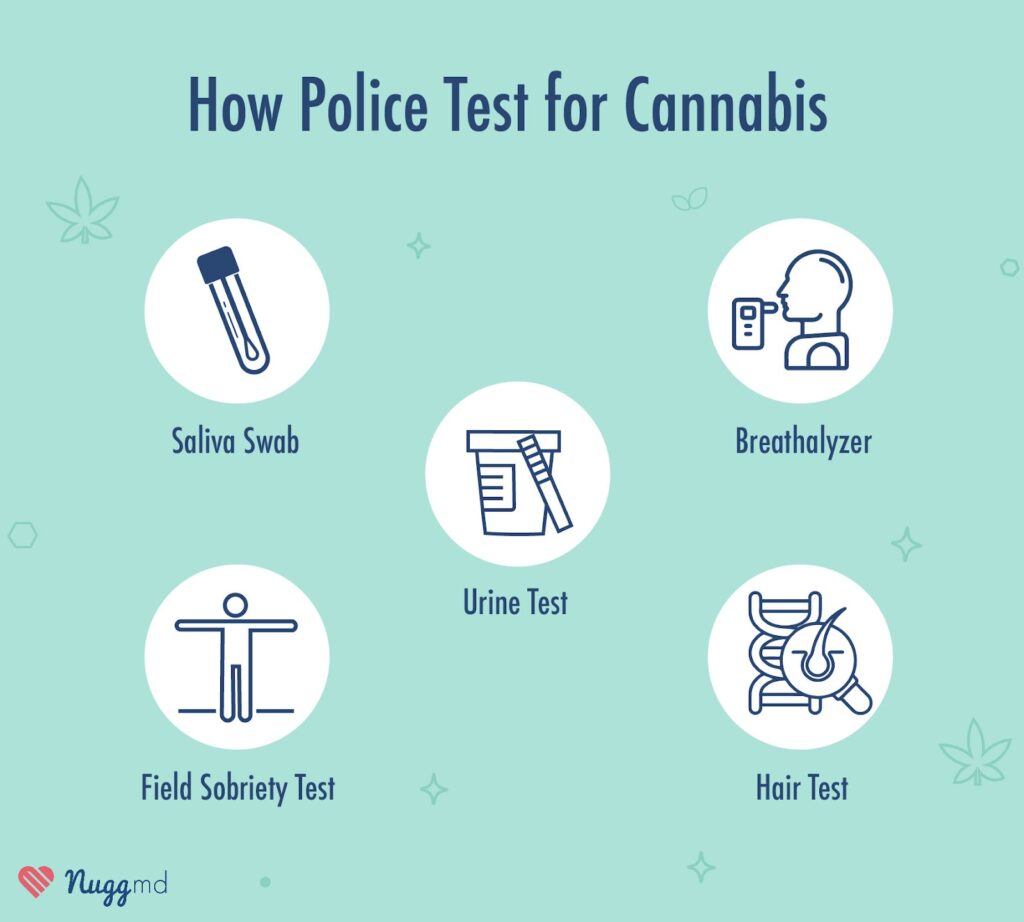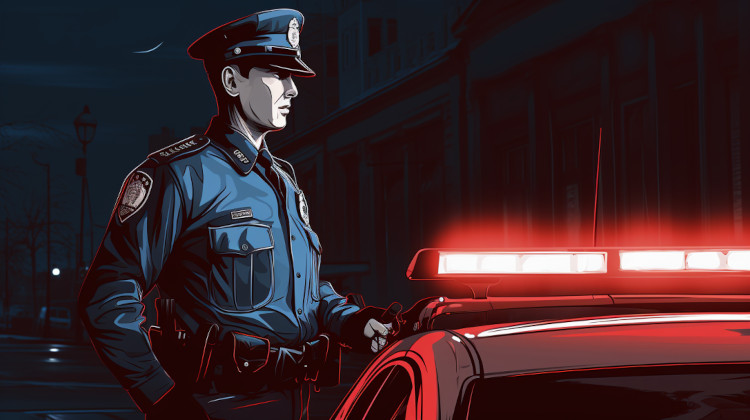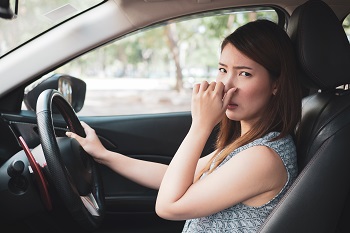In This Article
- Can You Get a DUI for Weed?
- How Long After Smoking Weed Can You Get a DUI?
- How Do Cops Test for Weed DUI?
- Breathalyzer
- Field Sobriety Test
- Saliva Swab
- Hair
- Urine
- Blood Sample
- What Are the Effects of Cannabis for Drivers?
- How long should consumers wait to drive after smoking weed?
- Is there a "safe" limit for cannabis use before driving?
- Can medical marijuana patients drive after consuming cannabis?
- How can I flush weed from my system quickly?
- How can I transport cannabis in my car to avoid confusion and/or a DUI?
- References
As the use of medical cannabis becomes more prevalent, it raises concerns about the potential conflicts between necessary medication and safe driving. Some people rely on medical cannabis throughout the day to manage their symptoms and improve their quality of life. However, their medicine can significantly impair their ability to drive safely.
Operating a vehicle under the influence of cannabis poses risks due to its effects on cognitive and motor skills, including impaired judgment, decreased reaction time, distorted perception of time and space, and reduced coordination. Such impairments can lead to accidents, injuries, and even fatalities for drivers, passengers, and others on the road.
So, if you are a medical cannabis patient or someone who uses cannabis recreationally, you need to understand the effects it may pose on your ability to drive safely.
Can You Get a DUI for Weed?
Yes, it is absolutely illegal to drive under the influence of cannabis in all states. Regardless of whether you are a medical cannabis patient or a recreational user, operating a vehicle while impaired can result in a DUI (Driving Under the Influence) charge.
Law enforcement agencies and legislators have long recognized the dangers of driving under the influence of cannabis. As a result, laws have been enacted across the United States to address this issue. These laws apply to everyone, including medical cannabis patients who may rely on cannabis for therapeutic purposes.
When enforcing DUI laws related to cannabis, police officers are trained to identify signs of impairment during traffic stops. While the presence of cannabis in a person's system can be detected through blood tests, the technology for immediate on-the-spot testing, like the breathalyzers used for alcohol, is still evolving.
There is currently no universally accepted standard for determining cannabis impairment levels equivalent to the blood alcohol content (BAC) used for alcohol impairment. However, law enforcement agencies have other means to establish impairment, such as conducting field sobriety tests and assessing observable signs of intoxication during a traffic stop.
Also, remember that the smell of cannabis alone may not provide reasonable suspicion for a search or arrest in some states. However, to avoid any potential legal issues, always refrain from consuming cannabis while operating a vehicle and store cannabis products securely when transporting them.
Here are a few tips to consider:
- Use a sealed container: Keep your cannabis products in a sealed container to prevent odors from permeating your vehicle.
- Store it out of reach: Place the container with cannabis securely in a location not easily accessible to the driver or passengers.
- Preferably in the trunk: If possible, store your cannabis products in your trunk, as this can further minimize potential legal concerns.
How Long After Smoking Weed Can You Get a DUI?

The length of time THC (tetrahydrocannabinol) remains in the body varies depending on things like the method of consumption, the person's individual metabolism, and the individual's tolerance. However, when it comes to driving, there's a difference between being intoxicated and having the presence of THC metabolites in your system.
THC is the intoxicating compound in cannabis that causes any driving-related impairment, while THC metabolites are the byproducts produced by the body as it processes THC. These metabolites may linger in the body for days, weeks, or even months after someone uses cannabis. However, this doesn't mean that the effects of THC last that long – after 24 hours, no intoxicating effects should be experienced.
So, while a driver may no longer be experiencing the intoxicating effects of THC, it may still be possible to test positive for cannabis so long as the metabolites remain in their system.
The method of cannabis consumption plays a significant role in the duration of potential impairment. Inhalation methods like smoking or vaping typically result in more immediate effects. However, these effects usually wear off within 2 - 3 hours or so.
On the other hand, edibles take longer to metabolize in the body. The effects may take longer to kick in, sometimes up to two hours. From there, it's possible to feel intoxicated for 6 - 12 hours (and sometimes longer), depending on the dosage.
While the effects of cannabis intoxication may subside within a few hours for most people, it is generally recommended to wait a minimum of 3 to 4 hours or longer after using cannabis before attempting to drive, as driving-related impairment can persist even after the immediate effects wear off.1
Always prioritize safety and make responsible choices when it comes to weed and driving. Ultimately, the best approach is to avoid driving if you have used cannabis recently. Instead, opt for alternative transportation methods or wait until you are confident that the impairing effects have completely subsided.
How Do Cops Test for Weed DUI?

Most people are familiar with the process involved in an alcohol-related traffic stop. A cop pulls someone over and asks them to blow into a breathalyzer. However, it isn't so simple when it comes to weed.
Still, law enforcement agencies use various methods to test for cannabis impairment during a DUI investigation. Most of these testing methods ultimately aim to detect the presence of THC (tetrahydrocannabinol) or its metabolites in the body. Law enforcement is unlikely to test for CBD.
Breathalyzer
Breathalyzers, like those commonly associated with alcohol testing, are being developed to detect THC in breath samples. However, THC breathalyzer technology is still in its early stages of development, and the ones that currently exist are notoriously unreliable, if not entirely useless.
Therefore, it's almost certain that a police officer investigating whether or not a driver is impaired by cannabis will not be using some kind of weed breathalyzer.
Field Sobriety Test
Without reliable breathalyzers, and with other tests potentially taking days or months to return results, police may use field sobriety tests to determine if someone is driving under the influence of cannabis.
Saliva Swab
Saliva swab tests are gaining popularity as a roadside testing method. They involve swabbing the inside of the mouth to collect a saliva sample for analysis to detect the presence of THC and other substances in your system, providing almost immediate results. Saliva swab tests are relatively quick and non-invasive, making them convenient for roadside testing. However, their effectiveness in determining impairment levels is still being studied, and their use by law enforcement has raised civil liberty and constitutional issues.
Hair
Hair tests are not commonly used for roadside testing. Still, they may be employed in certain situations requiring a more extended detection window. Hair samples can provide a historical record of drug use, as THC and its metabolites can be detected in hair follicles for a prolonged period – potentially up to 90 days. However, hair testing does not indicate current impairment and can only be done if an officer has probable cause or a person has been arrested.
Urine
Urine tests are commonly used to detect the presence of THC metabolites, such as THC-COOH, in the body. Like hair tests, these can indicate past cannabis use but do not necessarily reflect current impairment. THC metabolites can remain detectable in urine for up to several weeks after use. Therefore, urine tests have limitations in determining recent impairment levels and may not be the most accurate method for assessing impairment at the time of testing.
Blood Sample
Blood tests are considered one of the most reliable methods for detecting recent cannabis use and determining impairment levels. They can measure the concentration of THC in the bloodstream, providing a more accurate assessment of current impairment. However, obtaining a blood sample typically requires a trained medical professional and cannot be done on the side of the road. Not only that, blood tests (without the consent of the person being tested) can only be conducted if the police receive a warrant to do so. They are commonly done after an arrest and are often used as evidence in legal proceedings.
What Are the Effects of Cannabis for Drivers?

Driving under the influence of cannabis can be dangerous and may impair your ability to drive in several ways:
- Altered perception of time and space: Cannabis use can distort a person's perception of time, leading to difficulty in accurately judging distances and reacting to road hazards in a timely manner.2
- Impaired judgment and decision-making: Cannabis can impair a person's ability to make sound judgments, leading to risky driving behaviors and poor decision-making on the road.3
- Decreased coordination and motor skills: Cannabis can hinder coordination and motor skills necessary for tasks such as steering, braking, and maintaining proper lane control.4
- Decreased attention and concentration: Cannabis use may result in reduced attention span, difficulty maintaining focus on the road, and impaired concentration, increasing the risk of accidents.5
So, how does the impairment caused by cannabis compare to other things like alcohol and cell phones?
Comparing the effects of cannabis and alcohol on driving is complex due to their different mechanisms of action. Research suggests that cannabis may impair certain driving-related functions to a lesser extent than alcohol.6 Still, combining cannabis and alcohol can result in compounded impairment and significantly increase the risk of accidents.
Of course, using a cell phone while driving is another dangerous distraction. For this reason, many states have enacted laws against using cell phones while driving. If you're asking, which one is worse: driving while high or while using a cell phone? Well, it's a bit hard to say. However, some studies have found that "The impairments associated with using a cell phone while driving can be as profound as those associated with driving while drunk."7
Finally, what if you weren't the one smoking, but you were exposed to secondhand weed smoke? Can that impair your driving, too? Well, exposure to secondhand cannabis smoke may have mildly intoxicating effects, but the level of impairment is generally minimal compared to active cannabis use. However, the direct inhalation of secondhand cannabis smoke can still result in detectable levels of THC in the bloodstream, potentially leading to impairment and a positive drug test (should one be conducted).
How long should consumers wait to drive after smoking weed?
The general recommendation is to wait a minimum of 3 to 4 hours after smoking weed before driving. However, the duration of impairment can vary depending on factors such as the potency of the cannabis, individual metabolism, and tolerance levels. It is always best to err on the side of caution and wait for any impairing effects to subside before getting behind the wheel.
Is there a "safe" limit for cannabis use before driving?
Unlike alcohol, which has established legal limits for blood alcohol concentration, determining a specific "safe" limit for cannabis use before driving is challenging. Cannabis (and all its various compounds) is a complex plant that affects people differently. Remember that any level of impairment can increase the risk of accidents. So, the best course of action is to avoid driving altogether if you have recently used cannabis.
Can medical marijuana patients drive after consuming cannabis?
Medical marijuana patients face unique challenges as they may require cannabis for therapeutic purposes throughout the day. However, it is still necessary to prioritize safety. Even if you have a medical marijuana card, driving under the influence of cannabis can still result in a DUI. Explore alternative transportation methods or wait until you are confident that the impairing effects have subsided before driving.
How can I flush weed from my system quickly?
The most reliable way to pass a drug test is to abstain from using cannabis altogether. However, if you're short on time, staying hydrated is crucial, as it promotes frequent urination and helps dilute the concentration of THC metabolites in your system. Regular exercise can help burn fat cells where THC is stored, potentially reducing the detection window. Some people also turn to detox drinks or herbal supplements, although their effectiveness is not scientifically proven and may present unique health risks for some consumers.
Nevertheless, these methods may not guarantee immediate results, and factors such as your metabolism and frequency of use can influence the detoxification process.
How can I transport cannabis in my car to avoid confusion and/or a DUI?
To avoid confusion or potential legal issues, always transport cannabis in compliance with local laws and regulations. Some tips for safe transportation include:
- Keep cannabis products in a sealed container or bag to prevent odors and deter unwanted attention.
- Place cannabis products out of reach, preferably in the trunk or another secure compartment, to ensure they are not easily accessible while driving.
- Familiarize yourself with the specific laws regarding cannabis transportation in your area to ensure compliance.
References
- Pearlson GD, Stevens MC, D’Souza DC. Cannabis and Driving. Frontiers in Psychiatry. 2021;12. doi:https://doi.org/10.3389/fpsyt.2021.689444
↩︎ - Sewell RA, Schnakenberg A, Elander J, et al. Acute effects of THC on time perception in frequent and infrequent cannabis users. Psychopharmacology. 2012;226(2):401-413. doi:https://doi.org/10.1007/s00213-012-2915-6
↩︎ - Wesley MJ, Hanlon CA, Porrino LJ. Poor decision-making by chronic marijuana users is associated with decreased functional responsiveness to negative consequences. Psychiatry Research: Neuroimaging. 2011;191(1):51-59. doi:https://doi.org/10.1016/j.pscychresns.2010.10.002
↩︎ - Prashad S, Filbey FM. Cognitive motor deficits in cannabis users. Current Opinion in Behavioral Sciences. 2017;13:1-7. doi:https://doi.org/10.1016/j.cobeha.2016.07.001
↩︎ - Crean RD, Crane NA, Mason BJ. An Evidence-Based Review of Acute and Long-Term Effects of Cannabis Use on Executive Cognitive Functions. Journal of Addiction Medicine. 2011;5(1):1-8. doi:https://doi.org/10.1097/adm.0b013e31820c23fa
↩︎ - Sewell RA, Poling J, Sofuoglu M. The Effect of Cannabis Compared with Alcohol on Driving. American Journal on Addictions. 2009;18(3):185-193. doi:https://doi.org/10.1080/10550490902786934
↩︎ - Strayer DL, Drews FA, Crouch DJ. A Comparison of the Cell Phone Driver and the Drunk Driver. Human Factors: The Journal of the Human Factors and Ergonomics Society. 2006;48(2):381-391. doi:https://doi.org/10.1518/001872006777724471
↩︎
The information in this article and any included images or charts are for educational purposes only. This information is neither a substitute for, nor does it replace, professional legal advice or medical advice, diagnosis, or treatment. If you have any concerns or questions about laws, regulations, or your health, you should always consult with an attorney, physician or other licensed professional.




